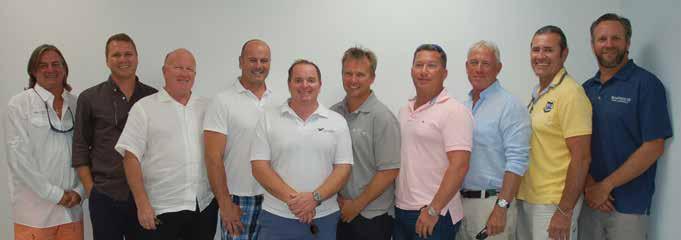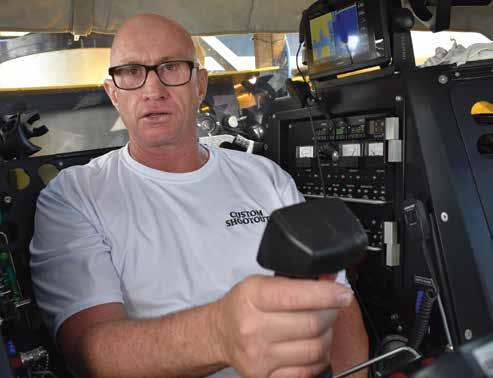
16 minute read
Yes you can take it with you
Editor’s note: Bosun Alex Kempin has written about finances for yacht crew for The Triton since May. Below are snippets of a few of his columns. To read these full columns, visit www.the-triton.com and search “The Money Dock”.
The Money Dock Bosun Alex Kempin
The way crew deal with money
Think about what money allows you to do, how much money you have, how much you have spent in the last month (be honest) and how much you earn.
I remember questioning the typical yacht crew narrative that suggests we should spend money and that somehow working for the wealthy elite creates a desire to spend like them.
The only way I was going to get anywhere near the level of wealth that yacht owners possess is if I begin to think like them. How do I cut costs? How do I maximize my income? How do I get my money working for me?
These thoughts helped me differentiate between spending like I’m already wealthy versus spending so I can be wealthy.
This doesn’t mean I never leave the boat or that I always volunteer for weekend watches. No, I just make small adjustments that eventually lead to bigger changes.
For example, instead of eating dinner out, I will eat onboard and then meet the crew out for drinks. Or I’ll learn to fix my surfboard myself to avoid high labor charges. I don’t consider myself to be giving anything up or missing out on events. I simply create a balance between using the benefits of the industry and my social life.
Initially, I kept this information mostly to myself as I know most people don’t particularly enjoy talking about money or personal finance. However, I remember becoming frustrated by the lack of accessible information available, especially for the yachting industry.
So I created a personal finance dialogue within the industry, a forum where crew can discuss, learn and share. Themoneydock, my website and Facebook page, provides this space for crew.
There are forums in which all of my learned information is available for free. My intention is to change the way yacht crew deal with money and personal finance.
Know what you spend
July was a crazy month for my partner and I. After 3.6 years on board and 4.5 months of straight lockdown, we quit our jobs and were off to sunny Turkey.
As yachties do, we traveled with two suitcases, a 7-foot surfboard bag, and two kitesurfing bags totaling about 100kg. At the airport desk, sweating and desperately hoping the baggage cost that flashed on the screen was in pesos and not U.S. dollars, I swiped my credit card for the first time since lockdown. (It was in USD and I was half tempted to leave the surfboards at the airport.)
Sitting on the plane and thinking
back to the baggage cost, I thought “How many hours had I worked to pay for that extra baggage?”
It’s not an exact science – especially for yachties – but I figured it cost me roughly two days of work, or 16 hours, to lug my surfboards with me to Turkey. But it was totally worth it. My girlfriend and I would happily work those hours again because these items give us such joy.
A yachtie who earns $48,000 per year earns $4,000 a month, $1,000 a week, $200 per work day or $20 an hour. (This assumes a 50-hour work week, which I know isn’t typical in yachting but it makes for a nice example.) So $20 equals one working hour.
Please do not hesitate to submit a request. We are standing by to help!
We Continue to Serve Our Customers!
Specializing in Superyacht Parts, Equipment, Spe in Parts, uipmen Provisions, and Worldwide Logistics. Provi , and
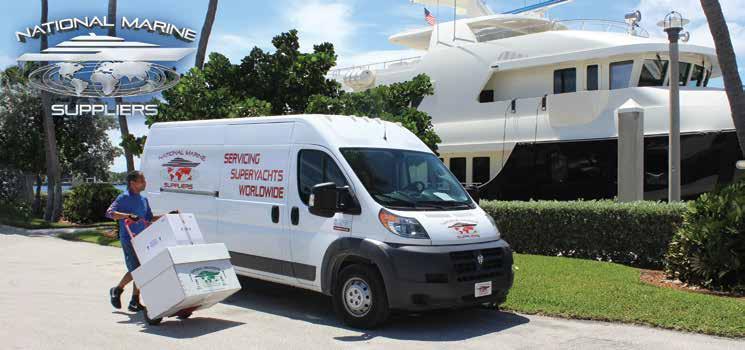
As we push through these uncharted trying times, we want you to know we are here for you. As long as our resources are available, we can and will assist you with all of your logistics. Thank you to our valued customers and the yachting industry for continuing to work with us as we try to accomplish the impossible at this time. We hope you and your crew are all staying healthy and well! Contact us to place your orders. www.nationalmarine.com
If a big night out with crew mates costs $350, that’s 17.5 working hours. Is it worth it? That $600 handbag is equal to 30 hours of work. Is it worth it? A new $1,200 drone is about 60 hours. Is it worth it?
I often use this formula to decide whether something is worth my time. And it depends. Does it bring pleasure? Does it meet some need I have decided for myself? Only I can answer those questions.
The money in yachting comes fast and hard, and there is a correlation between how quickly money is made versus how quickly it’s spent. But the spending habits of some yacht crew damage their future financial security and can trap them in jobs they’d rather not be in.
Each dollar we spend means giving up more of our time in the future to regain that dollar.
To be financially successful and claw back our personal time, our perspective of spending needs to change. Yachting is known for being lucrative yet typically short-lived, and it would be a tragedy to not take advantage of these few lucrative years.
I implore all yachties to use the “money equals time” formula to discover what is worth spending on, and then to find balance between spending and saving so they can ensure financial stability.
What if you lost your job?
Given the volatile nature of yachting jobs, I would expect crew to be able
to absorb a job loss and remain unemployed for several months without experiencing financial strain. However, it seems for the most part that I am wrong.
For an industry to which so many are attracted by the money, there exists a gaping discrepancy between salaries and savings.
It’s common for wannabe crew to live off their saved money whilst trying to secure a full-time gig. It’s clear then, that the savings mentality is there, yet it seems to disappear as soon as gainful employment is found.
Now more than ever, an emergency fund is a powerful component of a crew member’s financial world. Depending on lifestyle and risk level, yacht crew would ideally have 6-12 months worth of realworld living expenses. This means the cost of rent, groceries, insurance, etc., basically the traditional expenses of a landlubber.
An emergency fund is just that, it’s for emergencies. Losing a job, falling ill, prolonged unemployment, bills, hotel stays, last-minute flights or even posting bail.
This is quite literally the first step toward financial freedom as it allows yacht crew to live, spend and invest how they choose, armed with the knowledge that they will always have backup if needed.
Waypoints to FI
Here are the six basic steps involved in achieving financial independence (FI).
Set up an emergency fund
There is no standard rule but most finance fanatics use the 6-12 month rule: enough to support your living expenses for 6-12 months should something untoward happen. This can be difficult for yachties as we don’t incur the same expenses as landlubbers do. So consider spending habits, necessary expenses and tolerance for risk to come up with a number to cover those living expenses for 6-12 months.
For example, I keep $10,000 in a quickly accessible term deposit should I need to cover an unexpected flight, rent for a few months or a hospital bill.
Pay yourself first
Set up automatic payments so that when a paycheck arrives, a certain percentage is immediately deposited into a savings account. This removes the temptation to spend and avoids the psychological struggle of manually transferring money into a savings account.
Live below your financial means
This is the financial version of weight loss. When we spend less money than we earn – eat less than we burn – we One of my clients took out a small save money. loan to cover the cost of his chief mate’s
This requires an understanding of ticket. This is good debt, although spending habits so look back over credit ideally, he should have saved separately card statements to see where money for this, which he now does. went over the past six Spend consciously months. For the majority of us yacht crew, living We cannot save Each dollar spent means a dollar further away from below our means should be ourselves rich. financial independence. relatively easy considering Look back on expenses and our lack of traditional understand what is of value expenses and our high earning power. and what is important.
Avoid bad debt Spend freely on what you love; save
Generally speaking, good debt is a ruthlessly on what you don’t. house mortgage or student loans, things Invest wisely that have strong future earning benefit. Investing is a huge component of Most other things are bad debt (vehicles, becoming financially independent. We jewelry, etc). cannot save ourselves rich. Our money must make more money whilst we aren’t working.
Most financially independent folk live off passive income, either in the form of rental properties or stocks, or both. Of course, you must work hard to be able to afford houses or large stock portfolios, and thankfully yachting is the perfect industry to do just that.
Bosun Alex Kempin has worked on yachts for more than three years and combines his passion for personal finance and his degree in psychology to share personal finance information for yacht crew at themoneydock.com or themoneydock on social media. Comments are welcome at editor@the-triton.com.
POWERING ONWARD FOR 70+ YEARS
When it comes to marine electric, Ward’s stands alone. We’ve led the pack for 70+ years. Our work — from surveys to engineering — has stood the test of time. Specialized service, surveys, electrical engineering, and parts, backed by decades of industry-leading innovation. There’s only one word in marine electric. Wards.
wardsmarine.com wards marine @wardsmarine
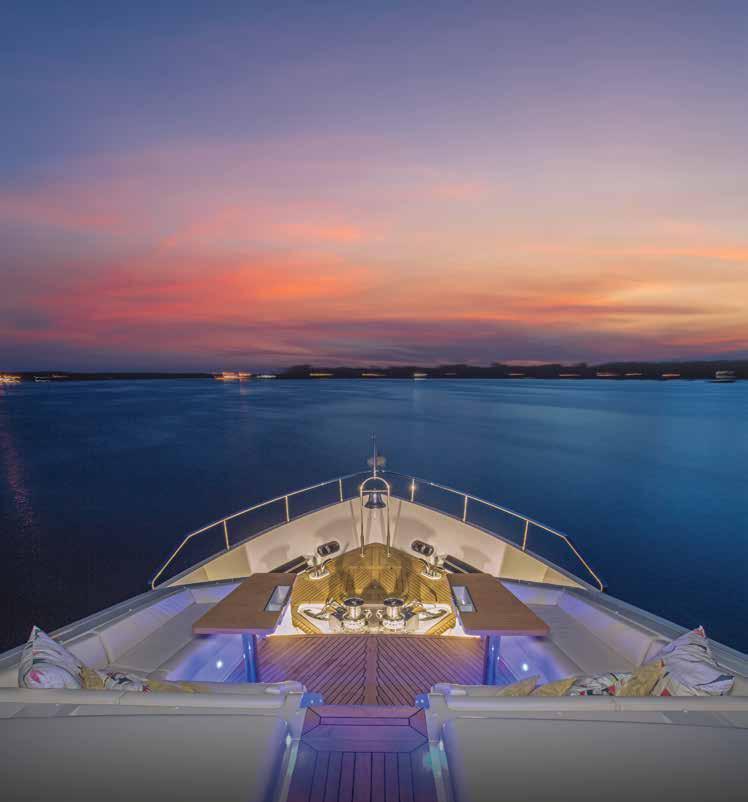
DOCKSIDE SERVICE | PANEL PRODUCTION | ENGRAVING | SALES PAINT | REFITS | INSIDE SERVICE | ENGINEERING
Friends surprised at sudden passing of veteran captain
By Lucy Chabot Reed week cruise with the owner and guests. He flew home to the United
Friends and colleagues mourned States in mid-September, and was what seemed like the sudden passing soon admitted to the hospital, where of Capt. Alexander Damrell Greenson he died about a week later. earlier this week. He died in the early Capt. Greenson got his start in morning hours of Sept. 26 of cancer. yachting aboard a small vessel in
In yachting more than 30 years, Newport in the summer of 1989. Capt. Greenson had just finished Industry veteran Norma Trease managing the build and launch of secured that post for him. M/Y EIV, a 165-foot (50m) Rossinavi “He walked into my office in formerly known as Project Vector. The Newport and said ‘I want to get into vessel launched in June, and one of his yachting and I’ll do whatever it takes’, social media posts from Aug. 6 shows ” Trease recalled. He had grown up him returning from sea trials. sailing in Connecticut and had what
It was at about that time – after a she called a prep school look, so she few months of random pain – that a found him a job that summer as chef/ biopsy confirmed a mass on his liver mate on the yacht of a friend. was cancer. He would work myriad jobs
Capt. Greenson remained over the ensuing decades, including committed to his job and boat, skippering the presidential yacht according to his partner, Caroline M/Y Sequoia in the late 1990s and Dewey, on his Caring Bridge journal, helping build the 105-foot modern and continued with a planned five- schooner America 2.0. He spent about seven years running M/Y Panthera, based in Ibiza. And he shared his experiences cruising in Greece during the 2004 Olympic Games in a Triton story. “His exemplary yachting career has inspired many crew to follow in his footsteps, and he is beloved and mourned by friends and family worldwide,” Trease wrote on her Facebook page this week. “It’s a big loss to me and many in yachting,” said Capt. Martyn Walker, who met Capt. Greenson in Palma when he was the stew on S/Y Aile Blanc, the 100-foot (30m) Camper & Nicholsons launched in 1939. Capt. Greenson would soon become her Capt. Greenson posted this photo on his social media channels on Aug. 6 with the caption “Heading into port after sea trial at sunset”. PHOTO/FACEBOOK captain. “On his recommendation in 2008, I
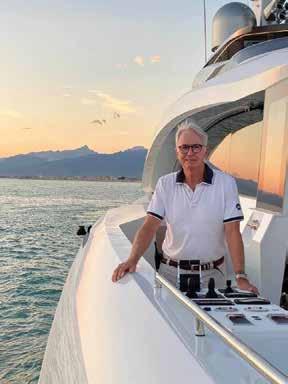

hired his daughter, Seldon, on M/Y Pegasus II and she met her now husband, Mark Jones, and they went off to excel in yachting after sailing with me for a couple of years” Capt. Walker said.
“One of the great distinguishing characteristics about Alex was his non-stop networking throughout his career,” said Trease. Being based in Ibiza meant he had the winters free, and he attended events, boat shows and parties regularly, she said. “His self education never stopped. He really worked hard on his career and personal growth.”
Most recently, he had invested time learning to be a better photographer, she said. He also had a passion for cycling At the ISS awards gala last year. PHOTO/SUKI@YACHTINGTODAY.TV and painting. The last time Trease saw Capt. Greenson in person was at last year’s International Superyacht Society gala just before the Fort Lauderdale show. She interviewed him on the red carpet wearing a “beautiful blue brocade dinner jacket.” on a cruise and he inherited it. It fit him like a glove. “He was a really special person and brought out really great things in the people around him, not only in yachting, but as a human,” Trease said. “He was a great human being.” “I asked him ‘Who are you wearing?’ and he said it was his grandfather’s dinner jacket,” she said. “His grandfather had bought it to go Lucy Chabot Reed is editor/publisher of The Triton. Comments are welcome at lucy@the-triton.com.
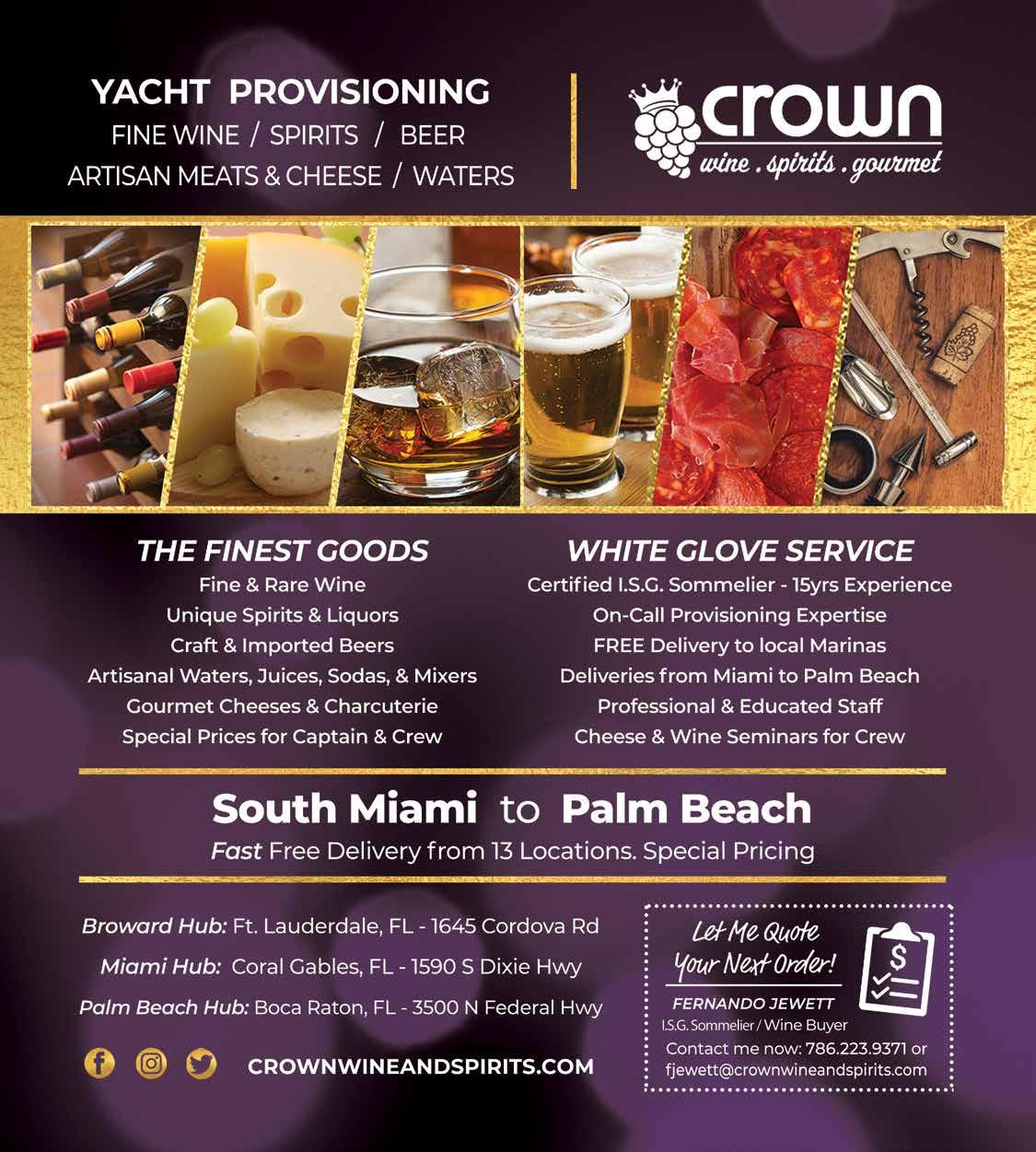
Captain of M/Y Unforgettable dies of COVID
By Lucy Chabot Reed
Capt. Christopher Hezelgrave, skipper of the 137foot (42m) Royal Denship M/Y Unforgettable, died Aug. 10 of the COVID-19 virus. He was 60.
Born in New Zealand and with a British passport, Capt. Hezelgrave had about 30 years experience in yachting and on commercial vessels, including motor and sailing vessels in charter, regatta and private use.
Educated in Australia, he studied as a shipwright and marine engineer, and carried the MCA Master of Yachts 3000gt. He also raced sailboats professionally for 12 years, according to his LinkedIn profile.
“He loved teaching,” Unforgettable First Mate Marco Stegmann said. “We have two newer guys on the crew, and he’s in the crew house with them, explaining charts, telling them what it’s like to be at sea. … He was really good; it was a pleasure working with him.”
Capt. Hezelgrave always tried to fully understand a situation and think outside the box when it came to solutions, Stegmann said. “And he’d force us to do the same. Why are things happening the way they are happening?”
In his most recent position with M/Y Unforgettable for the past seven years, Capt. Hezelgrave was also manager of the vessel, which has extensively cruised the U.S east coast, Caribbean south to Grenada, Panama, and Colombia.
“I strive at all times to provide a professional, reliable and fully comprehensive service as captain and in all associated aspects of yacht and crew management,” he stated on his profile.
The yacht is at Lauderdale Marine Center in Fort Lauderdale in the midst of a full paint job, mechanical maintenance including on the azipods and hydraulic system, teak deck refurbishing and other mostly exterior projects, Stegmann said. The work has faced several delays since the yacht entered the yard in February, adding to the stress Capt. Hezelgrave was going through, he said.
Capt. Hezelgrave went to a South Florida clinic a few weeks ago with back pain that wouldn’t go away after an incident onboard in early July. It was recommended he get an ultrasound, then he returned to the crew house where he and the crew lived while the yacht is in the shipyard.
“Then he started coughing and feeling worse,” Stegmann said. “He called the clinic again and they told him to come in for a COVID test.”
That was a Monday. That Wednesday night, July 15, he learned his test was positive. He continued to feel worse, Stegmann said, and on Saturday, July 18, he went to the hospital.
Eventually Capt. Hezelgrave was placed on a ventilator. He died Aug. 10 in the hospital.
“He was a little stubborn sometimes, but he was quite a fighter,” Stegmann said. “He was active and very fit; he loved sports. He was healthy. Everything went really quick.”
Although they all lived together in the crew house, Stegmann said none of the other crew have contracted the virus. They tested immediately after Capt. Hezelgrave received his positive test, and again after he left the house. All negative.
“We still don’t understand it, how he could get it,” Stegmann said. “The weird thing is, he had the most chance to get it from us. There are a lot of contractors on the boat, and they are all very strict with the guidelines. But we had much more interaction with people than he did. … He hardly left the house. He was working like crazy. The plan for the project is 30-40 pages. He was super busy, working seven days a week.
“Even when he was in the hospital, he would answer questions about the boat,” he said. “It’s all he thought about. He wanted to get the project done and get back to sea.”
Capt. Hezelgrave spoke five languages: English, French, German, Italian and Spanish. And he loved mingling with the local cultures,trying his tongue with the regional dialects.
“With this yacht, we cruise a lot,” Stegmann said. “Chris always loved to get with the locals, speak with the locals, the Patois, Creole. He enjoyed different cultures.”
He gave back to the industry in numerous ways, by being a mentor to his crew, by attending at least two Triton From the Bridge captains lunches to share his knowledge, and being open and honest about an incident where the vessel lost control and hit a dock in the Bahamas.
“We are dealing with it,” Stegmann said. “We’re staying busy and that’s keeping our minds busy. It’s a crazy yard period so it’s good that we are busy. … We don’t feel unsafe. It doesn’t matter where you are on this planet. You can catch it anywhere.”
Capt. Hezelgrave is survived by his partner, Yvonne van Gemert, and two adult children, who all live in Europe. When home, he enjoyed family life, meeting friends, riding his motorcycle and paragliding, according to van Gemert. His funeral took place at his home in Southern Germany.
Lucy Chabot Reed is editor/publisher of The Triton. Comments are welcome at lucy@the-triton.com.
Capt. Christopher Hezelgrave, third from left, took part in two of The Triton’s From the Bridge discussions, including this one from April 2017. TRTON FILE PHOTO
